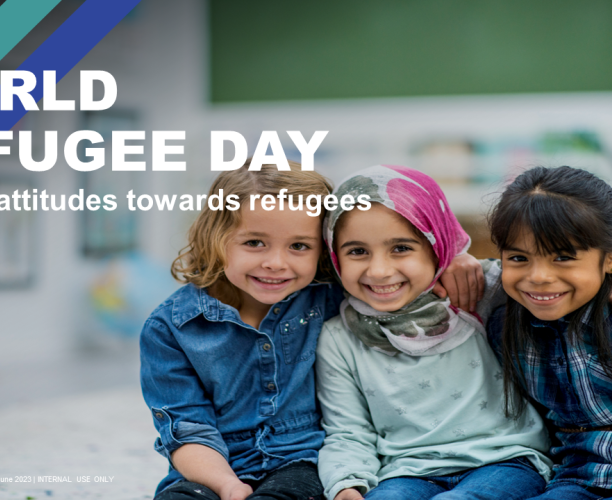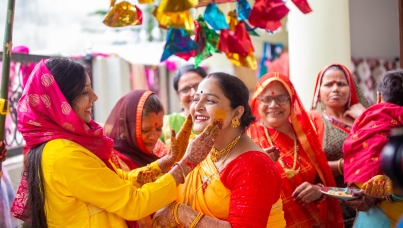

3 in 5 Indians support refuge for victims of war and persecution in India & other countries: Ipsos Global Advisor World Refugee Day Survey
The Ipsos Global Advisor, 29 country study shows interesting global attitudes towards refugees. Interestingly there is a lot of empathy seen for those who are victims of war and persecution and at least 61% of urban Indians polled and 3 in 4 global citizens (74%) believe victims of war and persecution should be allowed to take refuge in any country, including their own; countries supporting this view most were New Zealand (87%), Spain (85%), Great Britain (84%), Sweden (84%) and Canada (84%).
Published data shows, over the last decade, the number of forcibly displaced people has more than doubled, and at the end of 2022 it stood at a record 108.4 million, up 19.1 million on a year earlier and representing the biggest ever increase, according to the UNHCR (United Nations High Commissioner for Refugees), a UN Refugee Agency. Numbers are continuing to rise, with UNHCR estimating the global total in May 2023 to be 110 million. The growing effects of the climate emergency, increased wars/ conflicts, cost of living crises and concerning global economic outlook exacerbate existing displacement crises.
The numbers below show the countries facing the maximum influx of refugees and how each country is responding to those displaced by war and persecution and how welcoming they would be of them.
Attitudes towards refugees
58% of urban Indians polled believe most foreigners seeking refuge in India are not refugees but those wanting to get into India for economic reasons and to avail the welfare schemes. Though 1 in 2 urban Indians (53%) believe refugees make a positive contribution to the country. Though almost 6 in 10 Indians (57%) hold the view that we need to close our borders to refugees entirely and cannot accept any at this time. The sentiment was seen to be most dominant among the citizens of Turkey (76%), Malaysia (72%) and Peru (64%).
Policies on Refugees
Indians displayed divided views on refugees: 37% said we should let the refugees stay and allow more; 31% believe we should let the refugees currently in India stay and not allow anymore in the country; while 32% believe the refugees should be reported and not allowed anymore. Interestingly, we had New Zealand (68%), Spain (65%) and Brazil (63%) strongly in support of refugees staying and allowing more to take refuge. Citizens of Turkey (59%) wanted the refugees deported, and more not allowed.
About legal passage into India, 27% of urban Indians polled said there were enough legal routes into India for refugees, 29% believed that we need to provide more legal routes, while 22% felt there were no legal routes for refugees.
Why are countries compelled to take refugees? 34% urban Indians believe it is a humanitarian obligation; 17% feel it is legal obligation under international law (17%); 11% believe to boost the economy by bringing refugees with necessary skills, 9% believe to promote diversity and multiculturalism and 11% were undecided.
How are refugees treated? Good or bad?
At least 1 in 2 Indians (52%) polled felt refugees were treated well in India, while 24% felt refugees were not treated well in the country. 6 in 10 global citizens felt refugees were being treated well. And markets claiming to provide most fair treatment to refugees included Indonesia (89%), Poland (80%), Peru (74%), Germany (74%), Turkey (72%), Thailand (70%) and Canada (69%). South Africa displayed polarized views with 48% claiming fair treatment for refugees and 45% claiming unfair treatment for refugees.
Views on Policy for Asylum Seekers
Almost 4 in 10 urban Indians (39%) said they would support a policy that restricts the movement of asylum seekers (for example in detention centres or border facilities), until their claim for asylum was processed and they were given permission to remain in the country, while 22% opposed such a policy.
39% urban Indians said they would support a policy that sends applicants for asylum from their country to another host country, as a deterrent to others from attempting to enter their country. The policy was supported most by Turkey (53%) and Malaysia (48%) – nations that have been in the throes of great refugee influx.
Interestingly 6 in 10 urban Indians (61%) polled were of the view that allowing asylum seekers to work would help them learn about language and integrate. The view was most profound among the citizens of Sweden (80%) and Mexico (73%). While almost 6 in 10 Indians (59%) were also of the view that giving asylum seekers the right to work could attract people to the country without genuine asylum claims.
More number of Indians believe refugees have had a more positive impact than a negative impact in different areas.
|
S.No. |
Area |
Better (in %age) |
Worse (in %age) |
Turkey – Worse (in %age) |
|
1 |
Economy & jobs |
45% |
28% |
68% |
|
2 |
Schools |
53% |
20% |
62% |
|
3 |
Access to healthcare or health services |
51% |
22% |
65% |
|
4 |
Cost of Living |
50% |
23% |
66% |
|
5 |
Availability of housing |
49% |
25% |
70% |
|
6 |
Taxation |
42% |
28% |
59% |
|
7 |
Tourism |
51% |
21% |
60% |
|
8 |
Cleanliness of area |
51% |
25% |
63% |
|
9 |
Culture & Arts |
53% |
22% |
54% |
|
10 |
Level of Crime |
40% |
33% |
71% |
|
11 |
Welfare services |
49% |
22% |
64% |
|
12 |
Spread of infectious disease |
44% |
28% |
65% |
|
13 |
Social cohesion/ community relations |
48% |
23% |
67% |
|
14 |
Access to utilities such as electricity and water |
49% |
23% |
57% |
Turkey was seen to have contrary and strong views to all and according to their citizens refugees have negatively impacted most areas, worsening them, as shown above.
Actions taken to support refugees
Urban Indians claim to have taken a host of actions in the past 12 months to support refugees.
17% Indians claim to have donated funds/ goods to support the refugee cause; 17% claimed to have volunteered to help refugees; 16% have posted social media messages in support of refugees; 15% say they have contacted govt officials or signed petitions advocating for refugees and 15% have offered refugees a place to stay in their home. 55% claimed to have taken no action in the past 12 months in support of refugees.
Summarizing on the findings of the survey, Amit Adarkar, CEO, Ipsos India said, “The recent influx of refugees has been of Indians in other countries who have been victims of war and persecution and so the govt policies have been quite friendly towards them. Though in the past, most of the refugees entering India were from the border countries looking for better economic prospects. And the actions were different to control the influx, as they were perceived to be a strain on the limited resources. India does not work within the confines of the UNHCR but is home to lacs of refugees and has been providing them shelter. The survey shows even at the individual level Indians have been supporting the cause of refugees.”



